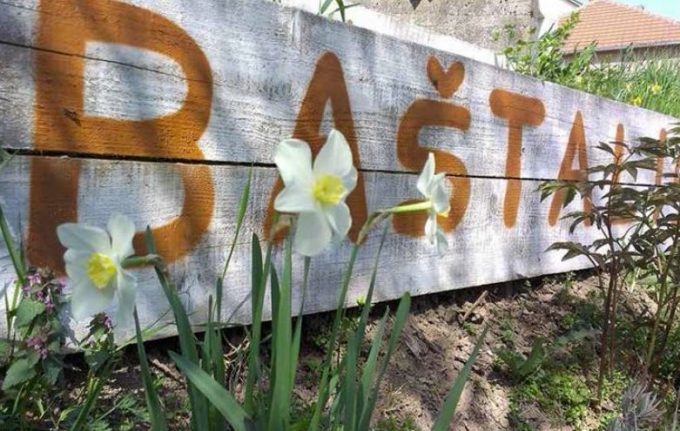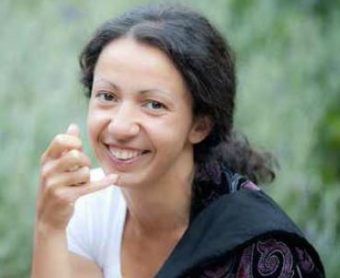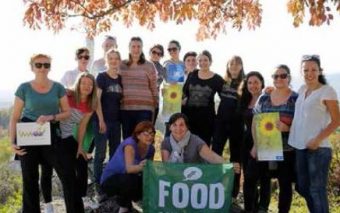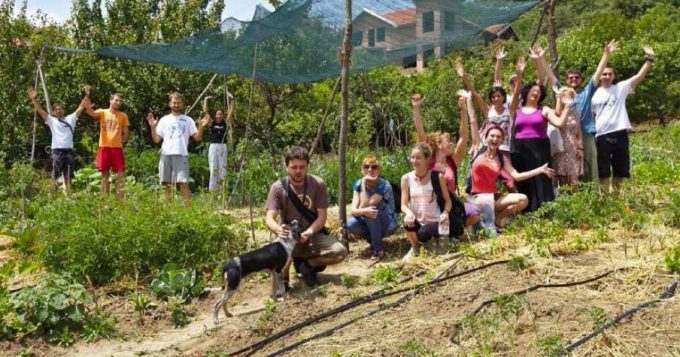
Katarina Milenkovic

Katarina Milenkovic–President of citizen’s society “Ama Centre” and the coordinator of “Bastaliste”
Katarina Milenkovic graduated communication from a Faculty of Political Sciences, the University of Belgrade. She was engaged in journalism and public relations, after which she founded the association “Ama – Centre for the Care of People and Nature”.
Katarina grew up in Pirot and during the childhood, she had no contact with the village and agriculture. She gained a basic knowledge of agriculture owing to the Internet and volunteering on organic farms around the world.
During 2013, she established “Bastaliste”, a collective organic garden just 10 km from the center of the capital.
We learned techniques for organic vegetables growing from our own mistakes. We communicated with people from Slanci and watched what they were doing. In every generation of gardeners, we had a few of them, remembering how their grandparents were growing vegetables. For the last two years, we have had a professional association for organic agriculture in “Bastaliste”, who comes once a month, diagnoses our parcels and advises us what to improve. People from Slanci recognize “Bastaliste”: I hear positive comments very often when going by public transport. They see us simply as “those who do not spray anything!”. That means a lot to me, because of people from Slanci supply Belgrade with food,” said Katarina, adding that she is not actually a food producer, but perhaps even the worst gardener in “Bastaliste” since her plot has the most weeds.
− I would like to point out that I quit “safe work” because I wanted to do what I deeply believe in. When you work for someone else, you usually only participate in other people’s visions. Although it’s nice to work in a community if you have your own vision, it’s better to look for your own place. When I founded “Ama Centre” four years ago, I started a struggle to achieve my own vision, that is, everyone should have access to food, not just any kind of food, but to food good for their body and whose production has no harmful effect on the environment – Katarina tells us the story of the “Ama Centre”.
“Ama Centre” shares numerous information and educational materials on sustainable agriculture on its website.
As one of its goals, Katarina states the concept of One municipality − one “Bastaliste”. In a desire to bring us closer to this vision, Katarina explains that garden communities as a form of urban agriculture represent more than the place where food is produced. In addition to the obvious benefits −, a nicely arranged space where the position of the population is being improved by food production, the message of sustainable development is transferred in practice. The garden also represents a green oasis that affects the microclimate of its environment and lowers the air temperature in the environment for several degrees.
“Bastaliste” was created while I lived in Slanci. In front of the house, there was a flat plot, which we rearranged and invited people to join us in the formation of the first garden community. In the debut season, we had 5 members. The following season, with the help of the President of the Local Community of the village of Slanci, we got a new plot, where “Bastaliste” has been for the fourth year now. And this was the “textbook example “ of abandoned land − uninhabited for 30 years, with lots of garbage, shrubs, and thorns − explained Katarina.

After three months of intensive work, members of “Garden” have brought the abandoned plot to a fruition. Today, this parcel has 22 subplots of 40 square meters that are handed over to the members of “Bastaliste” for the production of vegetables for their own needs. Gardeners share equipment, a drip irrigation system, and a pavilion that will host a number of workshops next year.
The time required to maintain the plot depends on the season. Spring is the most demanding time of year because at that time land is prepared and then sowing is performed.
Citizen’s Association “Ama Centre” works in the areas of sustainable development, environmental protection, organic production and permaculture, rural development, communities, youth, women’s and minority rights and the media. Projects of “Ama Centre” are WWOOF Serbia, Bastaliste, Bastaonica, and Women for Sustainable and Solidarity Agriculture.
WWOOF Serbia presents the education program through volunteering on organic farms throughout Serbia. Ama Center
is a member of the Global Federation of WWOOF Organizations (FoWO).
During the season it is necessary to pull weeds, to water the crops and to pick fruits. For a plot of 40 square meters, it is necessary to spend several hours two to three times a week.
− When you watch the plant grow and you know what you eat, it changes your view of the world, but also the mental and emotional state. Working with land and people fundamentally changes you. When you live and work in a garden community, you are drawn together. If my parcel was covered with weeds, it would affect the others. There are no concrete walls that would prevent the spread of weeds. Therefore, we must support each other so that our organic garden can survive. And that’s what makes us a garden community. So, apart from dealing with food production, we also present a social experiment that explores how much we are willing to give ourselves to others, how much we hurt and/or appreciate each other. Personally, I really enjoy it because the community is getting stronger every day – explained Katarina.
After “Bastaliste”, a garden community was founded in Sabac. Since the founders are acquaintances of the members of “Bastaliste”, the formation of another garden community in our country, was supported with the knowledge and experience of our debutants. There were initiatives for founding “Bastaliste” in other local governments, but so far no one has come into operation, so the citizens of Kragujevac, Novi Sad, Nis, and Obrenovac will wait for some time for their own production of organic vegetables.
The garden community, according to Katarina’s words, can be viewed as both open and closed system. Everything that is brought in it − remains there. There is no waste management system in Slanci, so the obligation to carry garbage to containers reminds people of any intention to produce garbage at all. On the other hand, “Bastaliste” realizes interaction with the environment. By composting the leaves and sorting recyclable rubbish, members of this community give an example of the environment.
− So far in “Bastaliste” we have composted and used natural spraying macerates. In the future, we will deal with “green” energy because we do not have a connection to the grid. The rainwater collection system would also be useful for irrigation. If someone wants to give such kind of contribution, the invitation to become our member is on – said Katarina.

The only formal condition for accessing this garden community is to give up on the use of artificial fertilizers and chemical preparations. At the end of each year, Ama Center invites new members, which is posted on their website, Facebook page, and mailing list. Interested candidates fill out an online questionnaire, on the basis of which the admissions committee gets an impression of who are the potential members, what values they live and what they believe in. A narrow circle of selected candidates is called on the day of open doors, where they are practically introduced to “Bastaliste” and we go through another round of interviews. The admission committee is made up of members from at least two previous seasons.
− There were some interesting experiences during the reception, from e-mail permutations and invitations of candidates that we did not like, to the disappointment and aggression of rejected candidates. Nevertheless, since the introduction of this system three years ago, our community is rapidly strengthening”, Katarina said proudly.
Ama Center cooperates with other civil society organizations, and Katarina is a frequent guest at various events. The concept of urban garden communities implies that they are located on publicly owned land, but the cooperation with the City of Belgrade has not yet happened.
− City authorities have been briefed on our project since foundation. We negotiated with representatives of several municipalities and secretariats of the City of Belgrade, ask- ing to give us the parcel for use. According to their reactions, the only problem is the lack of enforcement procedures, since the comments on the very idea are very positive. Still, I think that where there is a will − there is a way. We are at our disposal to transfer experiences from abroad since we know a lot on this subject − explains Katarina.
Environmental protection involves a large number of measures and activities, and the food takes a small part of it. However, food is close enough to man to understand its environmental impact. In Serbia, with the exception of associations dealing with organic agriculture, there are rare ones that, like “Ama Centre”, have an integrated approach that studies the position of food in the ecosystem.
− Of course, it will never be possible to produce all the food in urban areas, but if we do everything we can, we will save our planet − the only one we have. The civil sector is the one that initiates changes. State apparatus is by nature large, bulky and inert. In order for a change to happen, the first impulse is needed, which must come from citizens, because we care most about the quality of our lives. Our duty and obligation is to introduce novelties and fight for education. Being successful at that, depends on many factors, not only on us, especially in Serbia − such as it is, which of course does not mean that we should give up,” she explained.
At a recently organized conference of the United Nations, Food and Agriculture Organization of the United Nations (FAO) in Belarus, Katarina was the only representative of the civil sector in Serbia. During the event, FAO’s new goals were presented, and Katarina hopes that Ama
Center’s activities will contribute to the realization of these goals in Serbia.
On the World Food Day on October 16, in the Cultural Center “Grad”, for the second time this year “Delicatessen Monday” was held, during which food was prepared by members of “Bastaliste”. Prepared foods were harvested on their plots, with the purchase of only necessary supplements. They named dishes “Potage of the magic pumpkin and Jesenjska proja”, “Sataras a la Garden”, “Just a cake with lavender”, “Bundevara cake” and “Exotic banana bred” because the gardeners wanted to draw public’s attention to the use of locally grown food which almost has no environmental footprint, but also to promote urban and organic agriculture, as well as the concept of garden communities.
− I am very proud of the members who have initiated and organized these events. They did it great – Katarina is pleased.
Katarina Milenkovic recently was one of the speakers at the TEDx conference in Mokrin. The concept of these conferences is the transmission of messages that encourage the community to be socially responsible.
− To survive, only air and food are needed. Access to air is not limited so far (we will not speak about the quality this time), but the food that needs to be brought into the body at least three times a day – it ever is. In the world, a large number of people are starving or eating foods of inadequate nutritional value. Agriculture is one of the largest polluters of the environment. Every day, when we go to the grocery store or to the market, while cooking and eating, we must be aware that the food we eat leaves a trace on our environment. When a person realizes himself and begins to live by contributing his activities to making this world a better place, he opens the door for small revolutions. Look around – how you live, with whom you live and socialize, what you eat, where you are buying, what you are talking about, where your thoughts go. All this affects the world as it is. Energy and mental personal hygiene are enough to change things for the better. All these “small” revolutions together make up the “big” one that we all are waiting for. There is no “big” revolution, without change within a man.
In short, my motto is: MY PERSONAL CHANGES ALL (THE WORLD) – concluded Katarina with a succinct message she hopes to reach as many people as possible.
Prepared by: Marija Nesovic
This content was originally published in the eighth issue of the Energy Portal Magazine ECOHEALTH, in November 2017.


